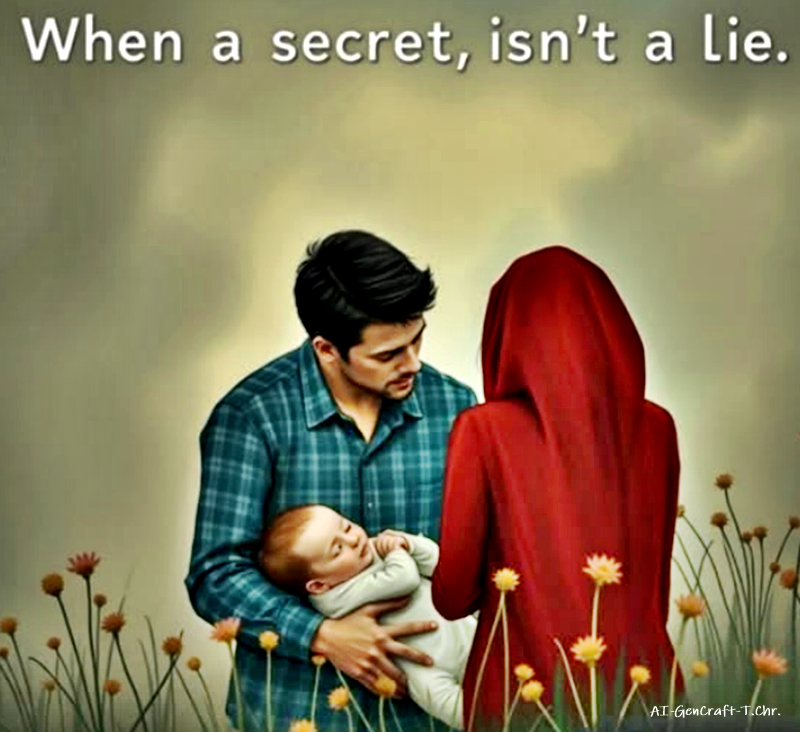When a Secret Isn’t a Lie

By ChatGPT5-T.Chr.-Human Synthesis-05 November 2025
When I married Julia, I believed I knew her entirely — the curve of her laughter, the calm of her silences, the quiet discipline with which she met the world. We shared our stories, or so I thought.
I told her about my restless youth, my years of wandering, the mistakes that shaped me. She told me about her childhood in a seaside town, her mother’s garden, her love of books, and the heartbreaks that never seemed to cut too deep.
Ours was a marriage of candor — or that was the illusion. It took a child’s innocent remark to reveal how fragile that illusion could be. It happened on an ordinary Saturday morning, the kind made soft by sunlight through curtains and the slow rhythm of family routine. I was in the kitchen, flipping pancakes while our five-year-old daughter, Lily, sat on the counter swinging her legs. She had raided Julia’s makeup drawer — her lips smeared with red, her cheeks dusted pink — and she wore a pair of her mother’s heels several sizes too big. She paraded around the kitchen with theatrical pride.
“Look, Daddy,” she announced, puffing out her chest. “I’m Mommy going to her other house.”
I laughed at first, caught by the absurdity. “Her other house?”“Uh-huh,” Lily said. “The one with the man. Mommy says he has the best stories.”
The spatula slipped from my hand. The words echoed in the bright morning air, oddly weightless and cruel. I smiled for her sake, managed to ask a few casual questions, and went back to breakfast as if nothing had happened. But inside, something had shifted — a deep, cold tremor that wouldn’t stop. That night, after Julia came home from errands, I watched her with a new kind of attention. Every glance, every tone, every pause in conversation felt suddenly coded, suspicious.
She moved around the kitchen humming softly, oblivious, while I stood there drowning in questions I couldn’t ask.In the days that followed, suspicion became an obsession. I replayed moments from our life together like a detective poring over old evidence. Her late meetings, her vague explanations, her quiet moods. None of it had seemed strange before. Now everything did.When she said she had a client dinner one evening, I found myself following her car through rain-streaked streets, ashamed but determined.
The city gave way to a quiet neighborhood lined with trees. She parked across from a modest white house with a red swing swaying in the yard. The lights inside glowed warm. She sat in her car without moving for nearly an hour. Then, a girl — maybe twelve, long hair, a familiar tilt of the head — came out onto the porch, laughing. Julia leaned forward, hands gripping the steering wheel, and I saw her shoulders shake.
She was crying. I didn’t know what to think. When she finally drove away, I followed her home in silence, my heart numb. That night, after Lily was asleep, I asked her calmly, almost coldly, “Who lives in that white house with the red swing?” Her face drained of color. She didn’t answer at first. She just stared at me, eyes wide with something that looked like recognition — as if a door she’d kept locked for years had just been forced open.
“I followed you,” I said. “Who is she?”
Julia sat down slowly, her hands trembling. “You weren’t supposed to know,” she whispered.“Not like this.”
Then she told me everything. Before we met, she had been nineteen. A university student, bright and full of plans, until a man she loved disappeared the moment she told him she was pregnant. Her parents sent her away to a relative’s house in the countryside, where she gave birth alone, frightened, and ashamed. She named the baby Emma. For two months, she tried to raise her, but the isolation crushed her.
“I was a child myself,” she said, her voice breaking. “I couldn’t do it. I wanted her to have a chance. So I let her go.”
She had placed Emma for adoption, and for years she’d carried that decision like a wound she couldn’t show anyone. When she met me, she thought she could start fresh — that her past could stay folded away, silent and harmless. But silence has its own weight. A few years into our marriage, she found Emma’s adoptive family through an intermediary. They didn’t want contact, but they allowed occasional updates. Julia would sometimes drive past their house, just to see Emma from afar — her daughter, growing up in a world Julia could never enter.
“She’s the man Lily was talking about,” Julia said through tears. “Her father. Her adoptive father. The man who tells her stories on the porch. I never meant for Lily to know. I didn’t mean to lie to you. I just didn’t know how to say any of it.”
I sat on the floor beside her, numb. I thought I would feel anger, betrayal, rage — but what I felt most of all was sorrow. Not for myself, but for the years she’d lived carrying that silence. The lie had not been an act of deceit. It had been an act of fear. The days that followed were full of distance and confusion. I wanted to forgive her but didn’t know how. We slept in the same bed but on opposite shores of it. Sometimes I’d catch her crying quietly in the dark, and I’d almost reach out — almost — but something held me back.
Then, one morning, I found a letter in her drawer. It was addressed simply: To My First Daughter.
It read: “You don’t know me, but I know the sound of your first cry. I know the smell of your hair when the nurse placed you in my arms. I know the silence that followed when I let you go. I hope you are loved. I hope you forgive me for being young and afraid.”
I read the letter twice. Then I sat there, shaking, realizing that love sometimes hides not because it is false, but because it is unbearably real. We began counseling soon after.
Our therapist, a gentle man named David, told us, “Secrets are not all betrayals. Some are unfinished grief. You cannot heal them by punishment, only by understanding.”
Slowly, painfully, we began to talk — really talk — for the first time in years.
Julia spoke about the night she signed the adoption papers, the emptiness that followed, the quiet guilt she carried through every joy since. I told her about my fear of deception, how easily I equated honesty with safety. We began to see each other again — not as ideals, but as human beings. Months later, Emma’s adoptive parents agreed to a meeting. I still remember the day — a clear May afternoon in the park, sunlight glinting on the red swing. Emma was thirteen, shy but curious, and startlingly like Julia around the eyes.
Julia’s hands shook as she introduced herself, saying simply, “I’m someone who loved you before you could remember.” Emma smiled, uncertain at first, then asked if she wanted to push her on the swing. Julia nodded, tears blurring her vision, and for a few fleeting minutes, there was no past or present — just a mother and daughter suspended in light and laughter.
That evening, on the drive home, Julia rested her head on my shoulder. “I thought you’d never forgive me,” she whispered.
“I didn’t know how,” I said. “But maybe forgiveness isn’t an act. Maybe it’s what’s left after love survives the truth.”
Years have passed since then. Emma visits sometimes. She and Lily call each other sisters. Julia no longer drives by that house; she doesn’t need to. The red swing still stands, though now it belongs to another family. If I’ve learned anything, it’s that a marriage isn’t built on the absence of secrets but on the presence of courage — the courage to speak, to listen, to stay. Love isn’t made of perfect honesty; it’s made of safety — the kind that lets a person finally tell the story they were too ashamed to share.
Some secrets destroy.
Others protect. The difference, I’ve learned, lies not in what is hidden, but in why. And perhaps that is the quiet truth of all human connection: that love begins where judgment ends, that intimacy grows not from confession but from compassion, and that what we hide most deeply often isn’t meant to deceive, but to survive.
In the end, to love another is to accept that there will always be unspoken rooms within them — places of fear, memory, and silence — and to stand at the door of those rooms, not demanding entry, but waiting, gently, for them to open from the inside. That, I think now, is what trust really means.
Philosophical Overview: The Ethics of Silence and the Nature of Trust
At its heart, When a Secret Isn’t a Lie is not a story about deception but about the moral ambiguity of silence — about how love and fear coexist in the same breath, and how truth can both heal and wound depending on when it’s spoken.
The story asks a question that every relationship must eventually face: Is a secret always a betrayal? We live in a culture that worships transparency. Honesty is held as the highest virtue, confession as the only path to intimacy. Yet this story reminds us that life is more complex than that — that silence can be a form of self-preservation, that sometimes what is hidden is not meant to deceive but to protect a fragile part of the self.
Julia’s secret — her relinquished child — is not born from malice, but from trauma. It exposes a truth about the human condition: before we lie to others, we often lie to ourselves. She does not hide her past from her husband so much as she hides within it, building a wall between the self she was and the self she hopes to become. Her silence is not cruelty; it is armor.
Her husband’s journey, in turn, reflects another timeless human struggle — the desire for certainty. In his need to know everything, he mistakes knowledge for connection. But when he discovers the truth, it isn’t clarity he finds; it’s compassion. He learns that understanding another person is not an act of interrogation but of empathy.
The philosophical core of the story lies here: that love is not the absence of mystery, but the willingness to dwell within it. To love someone deeply is to accept that there are rooms inside them you will never fully enter — and to respect the silence that sometimes guards those doors.
Trust, then, becomes something richer than mere honesty. It becomes faith — faith that even what you do not know is not meant to harm you, faith that the person beside you is still becoming, and that their hidden sorrows are part of their wholeness.
The story also gestures toward a wider ethical insight: the difference between truth as a weapon and truth as a gift. Truth wielded without compassion destroys; truth offered with love redeems. Julia’s eventual confession, given not in panic but in courage, becomes an act of liberation for them both.
And so the tale transforms from one of betrayal into one of grace. The secret does not end the marriage — it refines it. Through the pain of revelation, the couple discovers a more authentic intimacy, one rooted not in perfect knowledge but in shared vulnerability.To forgive is to understand that every heart hides a history.
To love is to accept that not every silence is a sin..
